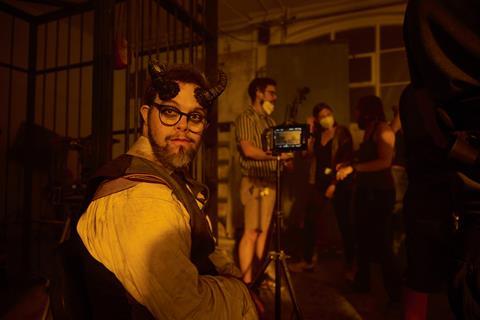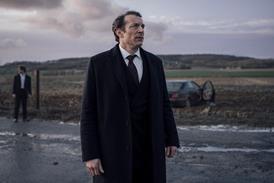Revelatory documentary follows Baxter, an artist with Down Syndrome, as he attempts to make his first short film

Dirs: Peter Beard, Bruce Fletcher. UK. 2023. 83mins
In 2017, aspiring filmmaker Otto Baxter set out to make his debut film; a 30-minute comedy-horror-musical short inspired by his own life experiences. Filmmaking is an uphill struggle at the best of times, but became even more challenging for Baxter because of his Down Syndrome — not that this posed any roadblock to his talent or ambition, rather to the support (and, specifically, funding) he was able to access. Following Baxter over six years as he determines to finish his film, this documentary exposes the discrimination and prejudice that is embedded not just in the creative industries but in wider society, and advocates for a long-overdue change in attitudes.
Advocates for a long-overdue change in attitudes
Filmmakers Peter Beard and Bruce Fletcher became close friends with Baxter after being hired to make a 2009 BBC Three documentary about his attempts to lose his virginity, and this mutual trust and camaraderie anchors the film. While the film may be about Baxter’s experiences as a man with Down Syndrome it is careful not to be entirely defined by it, instead presenting Baxter as the multi-faceted author of his own story; something that’s underscored by regular footage of him recording voiceover for this film. That should help it connect with further festival audiences following its recent Sheffield DocFest premiere, and draw attention to its limited, Bafta-qualifying September 1 theatrical release in the UK. The film is likely to find a wider domestic audience when it debuts on Sky (in a double bill with Baxter’s short) from September 17.
Now in his mid-30s, Baxter is no stranger to the limelight. Adopted by his mother Lucy — an extraordinary woman who features heavily throughout this film — after his biological mother, Alex, gave him up after birth, he has appeared on numerous television documentaries and talk shows, as well as in magazine and newspaper articles. Lucy, who has adopted three further boys with Down Syndrome, says she has often used her family to challenge misguided beliefs that those with Downs should be segregated from society in special facilities; something she witnessed first hand as a hospital volunteer from the age of 17.
Clips from Baxter’s TV appearances, from a young baby to a typical teenager, trying to pick up girls with best mate Jamie, are juxtaposed with shocking archive news footage; a 1970s street vox pop item asks passersby their thoughts on “mongol children” — responses range from sympathy to fear — while other choice snippets offer advice on how to treat “retarded” people. An 1990s on-camera interview with Alex, filmed during a time she came to visit a teenage Otto, is also eye-opening, as she discusses her unwillingness to commit to a lifetime of care for her son; a judgement clearly based on misinformation and fear. “A lot of nice elderly people have still got their Downs,” she says. “And I couldn’t do that”
If you think such opinions are now consigned to history, Baxter’s experiences suggest otherwise. His short film — a rollicking, gory horror musical called The Puppet Asylum, starring Paul Kaye, Myanna Buring and Rebecca Callard — is an attempt to articulate the hardships of life with a disability; namely the endless judgment and low expectations of others. The protagonist of his film is a ‘monster baby’, complete with horns, whose mother gives him away to an evil Master, after which he is rescued by a kind and caring woman. Eventually, however, the child has to confront the Master alone and assert his own authority and strength; a cathartic sequence in which Baxter relishes playing himself.
Watched on its own, The Puppet Asylum is an impressive debut short; viewed in tandem with this documentary, it takes on a powerful psychological context. Beard and Fletcher follow Baxter from initial production in 2017 through a four year forced hiatus due to lack of funding (during which his birth mother passed away) — nobody, notes producer Daisy Allsop, wanted to finance this particular project until Sky stepped in – to the resuming of filming in 2022. Throughout, they use the short to encourage Baxter to open up about his life in a way he has been previously unable to do. Some revelations are infuriating, others heartbreaking.
Yet the film does not encourage the vieweer to feel pity for Baxter — he is looking for allies, not sympathisers — neither does it put him on a pedestal or afford him any special treatment; the camera is there when he gets uncomfortably flirty with female crew members, for example. He is frustrated (and frustrating), often distracted and has a habit of responding to serious questions with belches, but he is also endlessly funny, unwaveringly kind and a dynamic creative talent.
Production companies: Archface Films, Story Films
International sales: Sky Studios, Lasharna.Ross@sky.uk
Producer: Daisy Allsop
Cinematography: Lorenzo Levrini, Bruce Fletcher, Peter Beard
Editing: Rupert Houseman, Richard Ketteridge
Music: Ed Harcourt
























